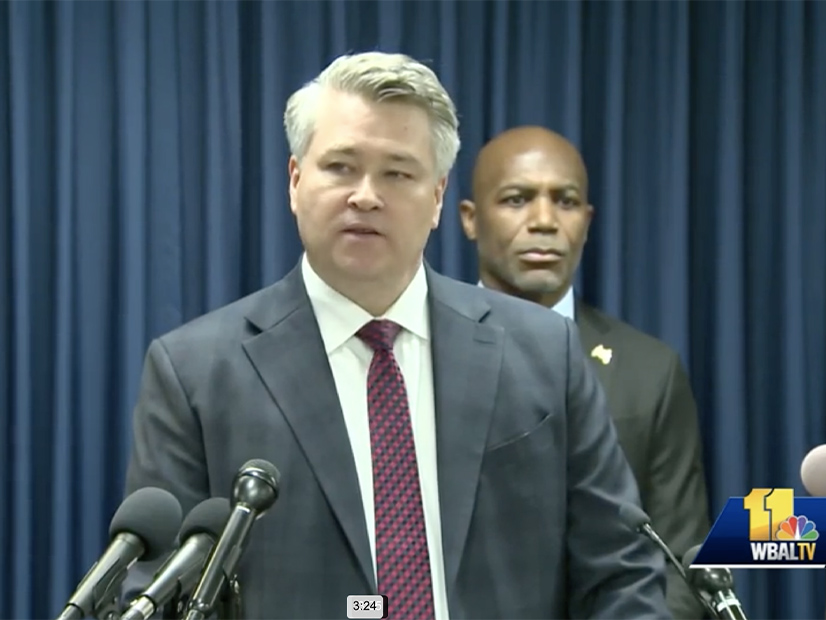
The Department of Justice has charged neo-Nazi leader Brandon Russell and associate Sarah Beth Clendaniel with plotting to attack electric substations in Baltimore, saying they envisioned a “legendary” attack that would “completely destroy” the city.
Russell — a resident of Orlando, Fla., and the founder of Atomwaffen Division, which DOJ considers a “racially or ethnically motivated violent extremist” group inspired by Nazi beliefs — “provided instructions and location information” to Clendaniel, of Catonsville, Md., FBI agent Tom Sobocinski said at a press conference Monday morning. Clendaniel plotted to acquire the weapons for the attack and identified five substations to target, according to a media statement from DOJ.
“The accused were not just talking, but [were] taking steps to fulfill their threats and further their extremist goals,” Sobocinski said.
Conspirators Met While in Prison
The criminal complaint against Clendaniel and Russell is still sealed, but a copy of the complaint obtained by CNN went into more detail about the pair’s plans, as well as how the FBI discovered their operation. According to the complaint, the two have been acquainted at least since 2018, when they exchanged correspondence while both were incarcerated at separate facilities.
 Mugshot of Brandon Russell from his arrest in 2018. | Pinellas County Sheriff’s Office
Mugshot of Brandon Russell from his arrest in 2018. | Pinellas County Sheriff’s Office
Russell was imprisoned in January 2018 for possessing explosive material, after a former Atomwaffen member told investigators that Russell and other members were planning to attack infrastructure including power lines and a nuclear plant in Florida. When the FBI arrested him for the Maryland plot, he had just completed his five-year prison term and was on a three-year supervised release. The reason Clendaniel was in prison in 2018 was not given in the complaint, but it did explain that she had a history of drug and robbery convictions.
While in prison, Russell struck up an online correspondence in June 2022 with a third person working for the FBI, identified in the complaint only as “CHS [confidential human source]-1.” Russell encouraged CHS-1 to carry out attacks against critical infrastructure, specifically electrical substations. As part of their conversation Russell provided the informant with white supremacist publications that discussed attacking critical infrastructure and called “putting holes in transformers … the greatest thing somebody can do.”
Russell first mentioned Clendaniel to CHS-1 last month, saying she was “serious and can be trusted.” Later the same day Clendaniel introduced herself to the informant, saying that she was terminally ill and wanted to “accomplish something worthwhile” before she died.
The complaint only discusses the messages between Clendaniel and CHS-1 and between CHS-1 and Russell, with no record of messages sent between Clendaniel and Russell directly or of chats involving the three of them.
As the three continued to develop their plan over the next few weeks, Clendaniel identified five substations she planned to target in a “ring” around Baltimore and told the informant that she would like to destroy all of them in the same day. She told CHS-1 that a successful attack would “probably” cause a cascading failure of the local grid. The FBI later confirmed that all five substations were operated by Baltimore Gas and Electric, a subsidiary of Exelon (NASDAQ:EXC).
“If we can pull off what I’m hoping … this would be legendary,” Clendaniel said on Jan. 29, according to authorities. Clendaniel allegedly said if they hit several of the substations on the same day, they “would completely destroy this whole city.”
Russell’s conversations with the informant included comparing the planned substation attack to December’s mass outages in Moore County, N.C., when unknown attackers damaged two Duke Energy (NYSE:DUK) substations with rifles and caused more than 54,000 customers to lose power. (See Duke Completes Power Restoration After NC Substation Attack.) Asked by CHS-1 why specific substations were chosen, Russell explained that they were selected to have the biggest impact on the power grid.
Asked how many people could have been affected if the attacks had gone through as planned, Sobocinski said that the FBI “believes this was a real threat,” and that “our hope is that it would have been minimal, but we couldn’t … tell you what that result would look like.” While Sobocinski declined to provide details of the arrest, the complaint said that investigators determined that the people communicating with their operative were Clendaniel and Russell based on details they disclosed in their chat conversations. Agents who were familiar with Russell’s voice were also able to recognize him on voice messages left with CHS-1.
Incidents of Violence on the Rise
Russell and Clendaniel’s plans are reminiscent not only of the Moore County attacks, but also of a plot to damage electric substations to which three men pleaded guilty nearly a year ago. In that incident Christopher Cook, Jonathan Frost and Jackson Sawall each admitted to planning to destroy critical infrastructure in order to “sow hate [and] create chaos” inspired by “racially or ethnically motivated violent extremist views.” Like Russell and Clendaniel, the conspirators were caught by law enforcement before carrying out their goals. (See FBI: Conspirators Planned Grid Attack to Start Race War.)
The arrests come just days after the Department of Energy released a report showing incidents of deliberate physical damage to bulk power system facilities rose by 77% in 2023 from the year before. (See DOE: Physical Attacks, Sabotage Jumped in 2022.)
The charges against Clendaniel and Russell of conspiring to destroy an energy facility carry a maximum sentence of 20 years in federal prison.



